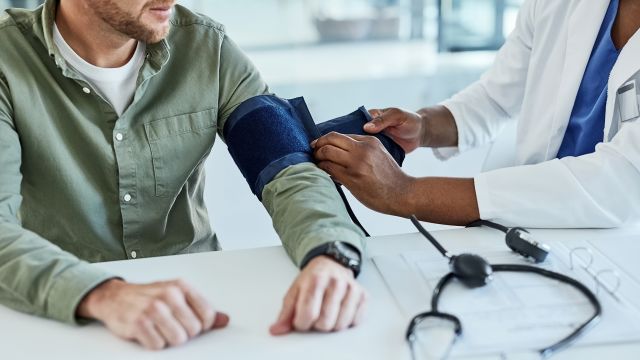If you’re one of the estimated 103 million Americans living with high blood pressure, you’re probably aware that a healthy lifestyle can help you keep your levels under control. But which habits offer the most BP benefits? We talked with Frank Ammaturo, MD, cardiologist at St. Mary Medical Center in Langhorne, Pennsylvania, for blood pressure best practices.
Eat right
Although French fries and chips are—let’s face it—delicious, they’re not so good for your body. “High sodium intake has been associated with high blood pressure and the American diet tends to be filled with higher levels of sodium than is recommended,” says Ammaturo. He suggests reading food labels so you know exactly how much is in your meal. “A lot of times, patients will say they don't add sodium to their meals, but that doesn't really mean they're on a low sodium diet. Processed foods, canned foods and restaurant menu items have excessive sodium,” he adds. The American Heart Association recommends you keep your daily salt consumption under 1,500 milligrams.
Stay active
Regular exercise is one of the most important things you can do if you’re living with hypertension—and it doesn’t have to be hardcore. Just 30 minutes a day can reduce your blood pressure by 4 to 9 millimeters of mercury (mm Hg). “Aerobic exercises such as walking, jogging, biking and swimming are preferred when you're looking at blood pressure control,” says Ammaturo. Your healthcare provider can help you create a fitness plan that’s right for you.
Watch your weight
If you’re overweight, losing just 10 pounds can lower your blood pressure. “Weight loss is a very important component for people who want to have well-controlled blood pressure,” says Ammaturo. “Unfortunately, the rates of obesity are high in America. One in three patients are obese.” Weight loss should be a top priority if your body mass index is greater than 25, Ammaturo adds.
Limit alcohol
Drinking in moderation may have certain heart health benefits. But overdoing it does not. “Excessive alcohol can be associated with elevated blood pressure,” says Ammaturo. Any more than one drink a day can cause your blood pressure to rise, and can lessen the effectiveness of blood pressure medications you’re taking. Remember: a serving size is 12 ounces of beer, 4 ounces of wine or 1.5 ounces of liquor.
Quit smoking
Smoking is hard on your body in so many ways—and when it comes to the heart, it can hurt blood vessels and harden the arteries. “Tobacco, specifically, can increase blood pressure so anybody who's concerned about their health should obviously focus on tobacco cessation,” says Ammaturo. Since it’s so addictive, Ammaturo suggests calling 1-800-QUIT-NOW or seeing your healthcare provider to get help.
Manage stress
Some stressful situations are inevitable, but if you’re looking to control hypertension, try to steer clear when you can. When you’re stressed, hormones increase your heart rate and constrict blood vessels, elevating your blood pressure temporarily. (That’s why your blood pressure tends to be higher at your healthcare provider’s office.) Try meditation, exercise and deep breathing if you find yourself in an uncomfortable situation. One study of about 21,500 Japanese adults found that taking six deep breaths over the course of 30 seconds lowered systolic pressure.
Other ways to reduce blood pressure:
- Have a laugh. In a small study, participants chose a 20-minute humorous video clip to watch. Then, researchers measured the participants' blood pressure. Watching funny videos not only lowered people's blood pressure but lowered their cholesterol levels, too.
- Get a massage. In another study, people averaged a short-term blood pressure drop from about 125 over 76 down to 115 over 70—after just 45 to 60 minutes of deep-tissue work from a licensed bodyworker. The massage sessions also induced a relaxing 10-point drop in heart rate. More research is needed to figure out if regular massage could reduce high blood pressure long-term.
Don’t shy away from medication
While it’s certainly important to stick to these healthy habits, your healthcare provider may recommend other forms of treatment, too. “An ideal blood pressure appears to be 115 over 75. Anyone with something above that should focus on lifestyle changes,” says Ammaturo.
If your levels are above 130 over 80, your doctor may recommend blood pressure-lowering medication in addition to lifestyle modifications, depending on your overall heart disease risk. If your blood pressure is above 140 over 90, you probably will need to take medication. Medications can reduce blood pressure levels and help you live a healthier, longer life.
“In clinical trials, blood pressure medications have been shown to reduce stroke by 35 to 40 percent, reduce heart attack by 20 to 25 percent and reduce heart failure by 50 percent,” says Ammaturo. The bottom line: Take care of your body, and if you’re in need of blood pressure management, don’t be afraid of taking medications to help regulate it.






